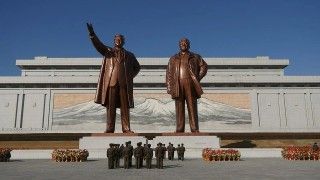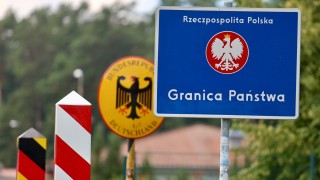- WIADOMOŚCI
- ANALIZA
Kiev – Last Chance Talks Between Russia And The West?
US Secretary of State, John Kerry, came to Kiev on Thursday, along with the French President Francois Hollande and German Chancellor, Angela Merkel. The latter ones are to spend the night in Kiev and go to Moscow on the next day to be involved in the negotiations with Vladimir Putin. These events have created many speculations regarding the stance the West has against Putin and Ukraine itself. Are we really witnessing a breakthrough, or are we experiencing a dissonance in between the stance of the US and the European powers?
After the public statements made in the USA, claiming that no military equipment would be transferred to the Ukrainians, this week similar claims have been made in Berlin and Paris. However, a new thread has emerged within the whole situation. Ashton Carter, who is the Obama’s candidate to become the new Secretary of Defense stated, in front of the Senate Armed Services Committee: “We need to support Ukraine in defending themselves”. Carter then added that he is inclined to deliver lethal weapons for the Ukrainians, which is in line with the Republicans’ will to make the actions against Moscove more decisive.
Craig Whitlock and Missy Ryan from „The Washington Post” claim, quoting unofficial sources from the White House, that, in the light of the new conflict, after a series of meetings, under the pressure of numerous US civilian and US military circles, the Obama’s administration is reassessing the potential support which could be provided for Ukraine. That issue will probably be widely discussed during the meetings which will involve Vice-President Joe Biden along with the Ukrainian President Petro Poroshenko and Angela Merkel, during the Munich Security Conference, which is planned to happen on Friday.
In any case, the White House seems to dissociate itself from the statement made by Carter, stating that diplomacy and negotiations are the only way of solving the conflict (by the way, stance of the Berlin authorities is identical). Nonetheless it is hard to consider the Carter’s statement to be accidental. In the eyes of the American analysts, an attempt of redefining the “support for Ukraine” may be a test of the US public opinion and of the opinion of the international community. The contradictory statements may also be a checking procedure, regarding the reaction of the Kremlin and of the Russian allies.
Opinions in NATO or even in the US vary, when it comes to realizing arms supplies for the Ukrainians. The following two options seem to be dominating:
1) The supplies shall start, as this is the ultimate solution, all other measures have been tested, death toll is going up, while the Kremlin is escalating the conflict even in the light of sanctions.
2) Supplying weapons to Ukraine is senseless, because the weaponry would be too advanced for the Ukrainian Army, and secondly, this would provoke the Russians to involve even more forces in the conflict.
Considering this in the light of the dissonance and the incoherence of the relationship between the US, Russia and the European Union, it is evident that the European goals could be different than those pursued by the US, particularly in case, when the US would decide to be involved in providing help for the Ukrainians, and the governments of the EU member states, which have good relations with the Kremlin, would decide to block the sanctions, newly imposed by the EU. The main question in this case is: are the activities of the French and the Germans a part of a larger plan, or are they just a plain mirror reflection of the US actions, goal of which is to take over the initiative.
“Kyiv Post” quotes the opinion of Timothy Ash from the Standard Bank, who stated that “[he doesn’t] think Merkel would get on the plane unless she thought that Putin was going to offer something. Kind of in the last-chance saloon. Maybe all this talk about the US arming the Ukrainians is driving Merkel and Hollande to go to Moscow to say to Putin you have a chance to back down now, or some NATO countries will begin to selectively arm Ukraine.” It is hard not to take such statements into consideration.
All of this mess in the West and competition, aim of which is to gain the titles of “defender of Ukraine” or “architect of the peace memorandum” (which, under the top layer, would provide a market for selling the armament along with a political impact in the region) is not really promising. All of that may cover the most important issue – the differences in the goals between the NATO allies, and between the NATO states and Ukraine. The political dialogue placed in the hands of Merkel and Hollande, which excludes the other EU countries from that process, considering the level of bureaucracy in the European Union, may need to include some concessions, which would never be ultimately accepted by the Kiev authorities.
Concept of “Peace at all costs” connected with the conflict of the interests among own allies and hurry may generate tragic consequences for the West. This situation may also allow the Russians to create a new front in their psychological warfare. So far, it seems that the US authorities are more aware of the fact that potential acceptance of the “peace talks” on the side of Russia is just a sophisticated diplomatic tool. Or just another stage of a “diplomatic process” which is more complex, and the longer this process is, the more victims of the conflict can be counted. And with the next victims, it would be gradually harder and harder to end the war without undertaking any decisive steps.
Adam Lelonek PhD
















